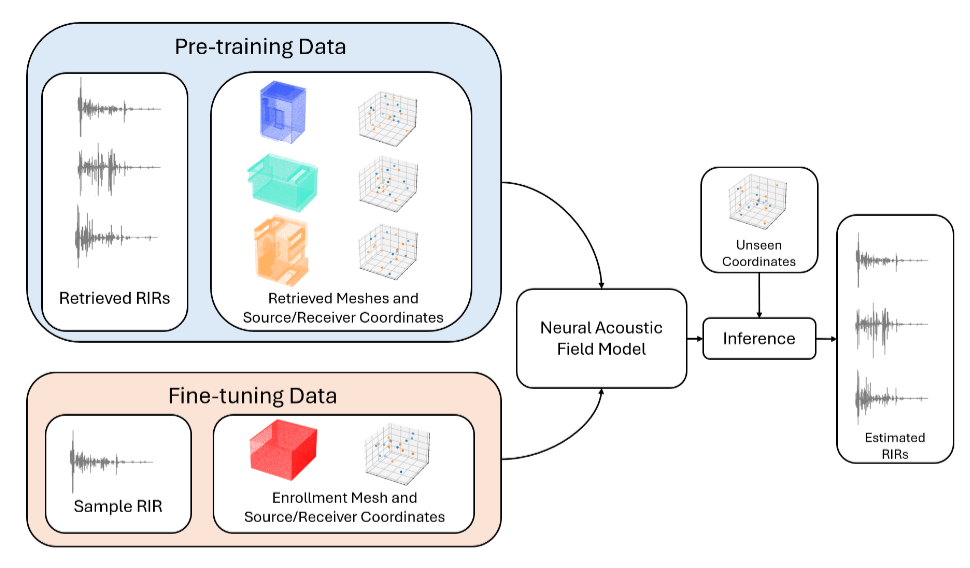AWARD MERL team wins the Generative Data Augmentation of Room Acoustics (GenDARA) 2025 Challenge
Date released: November 17, 2025
-
AWARD MERL team wins the Generative Data Augmentation of Room Acoustics (GenDARA) 2025 Challenge Date:
April 7, 2025
Awarded to:
Christopher Ick, Gordon Wichern, Yoshiki Masuyama, François G. Germain, and Jonathan Le Roux
-
Description:

MERL's Speech & Audio team ranked 1st out of 3 teams in the Generative Data Augmentation of Room Acoustics (GenDARA) 2025 Challenge, which focused on “generating room impulse responses (RIRs) to supplement a small set of measured examples and using the augmented data to train speaker distance estimation (SDE) models". The team was led by MERL intern Christopher Ick, and also included Gordon Wichern, Yoshiki Masuyama, François G. Germain, and Jonathan Le Roux.
The GenDARA Challenge was organized as part of the Generative Data Augmentation (GenDA) workshop at the 2025 IEEE International Conference on Acoustics, Speech, and Signal Processing (ICASSP 2025), and held on April 7, 2025 in Hyderabad, India. Yoshiki Masuyama presented the team's method, "Data Augmentation Using Neural Acoustic Fields With Retrieval-Augmented Pre-training".
The GenDARA challenge aims to promote the use of generative AI to synthesize RIRs from limited room data, as collecting or simulating RIR datasets at scale remains a significant challenge due to high costs and trade-offs between accuracy and computational efficiency. The challenge asked participants to first develop RIR generation systems capable of expanding a sparse set of labeled room impulse responses by generating RIRs at new source–receiver positions. They were then tasked with using this augmented dataset to train speaker distance estimation systems. Ranking was determined by the overall performance on the downstream SDE task. MERL’s approach to the GenDARA challenge centered on a geometry-aware neural acoustic field model that was first pre-trained on a large external RIR dataset to learn generalizable mappings from 3D room geometry to room impulse responses. For each challenge room, the model was then adapted or fine-tuned using the small number of provided RIRs, enabling high-fidelity generation of RIRs at unseen source–receiver locations. These augmented RIR sets were subsequently used to train the SDE system, improving speaker distance estimation by providing richer and more diverse acoustic training data. -
MERL Contacts:
-
External Link:
-
Research Areas:
-
Related Publications
- , "Data Augmentation Using Neural Acoustic Fields With Retrieval-Augmented Pre-training", IEEE International Conference on Acoustics, Speech, and Signal Processing (ICASSP) Satellite Workshop on Generative Data Augmentation for Real-World Signal Processing Applications (GenDA), April 2025.
BibTeX TR2025-045 PDF- @inproceedings{Ick2025apr,
- author = {Ick, Christopher and Wichern, Gordon and Masuyama, Yoshiki and Germain, François G and {Le Roux}, Jonathan},
- title = {{Data Augmentation Using Neural Acoustic Fields With Retrieval-Augmented Pre-training}},
- booktitle = {IEEE International Conference on Acoustics, Speech, and Signal Processing (ICASSP) Satellite Workshop on Generative Data Augmentation for Real-World Signal Processing Applications (GenDA)},
- year = 2025,
- month = apr,
- url = {https://www.merl.com/publications/TR2025-045}
- }
- , "Data Augmentation Using Neural Acoustic Fields With Retrieval-Augmented Pre-training", IEEE International Conference on Acoustics, Speech, and Signal Processing (ICASSP) Satellite Workshop on Generative Data Augmentation for Real-World Signal Processing Applications (GenDA), April 2025.
-


